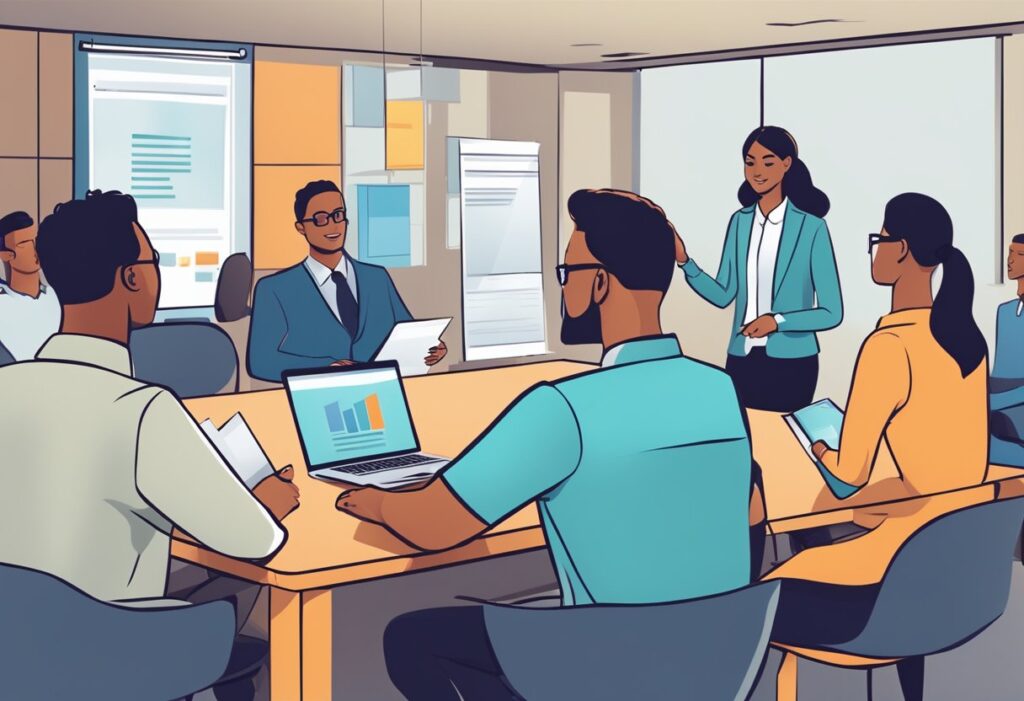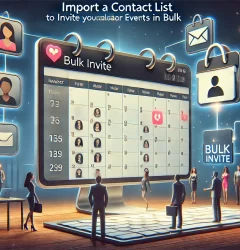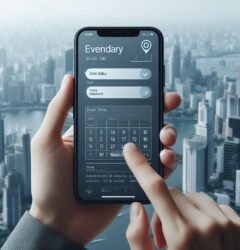- Email: [email protected]
- phone: +44 (0) 203 916 5117
15 Jan

Sending meeting invites is an essential part of B2B sales. It is a way to establish communication with prospects and customers and start a conversation that can lead to a successful business relationship. Meeting invites are also an opportunity to showcase professionalism and demonstrate the value of one's product or service.

Planning your mass meeting invites is an important aspect of B2B sales. It requires understanding your audience and tailoring the message to their needs and interests. Effective communication strategies should be employed to ensure that the message is clear, concise, and engaging. Leveraging CRM and sales tools can streamline the process and provide valuable data that can be used to optimize the sales process.
Building relationships and trust is a crucial component of B2B sales. Meeting invites can help establish credibility and show that one is serious about doing business. Maximizing follow-up and conversion is also essential to ensure that the conversation continues and leads to a successful outcome. Harnessing data for sales success can provide valuable insights into customer behavior and preferences, which can be used to refine the sales process and improve results.
Key Takeaways
- Meeting invites are an essential part of B2B sales and can help establish communication with prospects and customers.
- Planning mass meeting invites requires understanding the audience and tailoring the message to their needs and interests.
- Building relationships and trust, maximizing follow-up and conversion, and harnessing data for sales success are crucial components of B2B sales.
Planning Your Mass Meeting Invites

Sending meeting invites is an essential aspect of B2B sales, and it's crucial to have a well-planned strategy in place to ensure maximum attendance and engagement. Here are a few subsections that you can follow to plan your mass meeting invites effectively.
Send Meeting Invites With Hidden Attendee List
When sending mass meeting invites, it's crucial to keep the attendee list hidden to avoid any confusion or discomfort among the attendees. By keeping the attendee list hidden, you can ensure that the attendees feel comfortable attending the meeting and are not hesitant to share their thoughts and ideas.
Sending Meeting Invites One by One
Sending meeting invites one by one is an effective way to ensure that the attendees are engaged and interested in the meeting. By sending individual invites, you can personalize the message and make the attendees feel valued. It also allows you to follow up with each attendee individually, which can help build a stronger relationship with them.
Sending Meeting Invites Using Let's Calendar - Automation Tool
Using an automation tool like Let's Calendar can help streamline the process of sending mass meeting invites. With Let's Calendar, you can automate the entire process of sending meeting invites, from scheduling the meeting to sending the invites and following up with the attendees. It also allows you to track the attendance and engagement of each attendee, which can help you improve your future meetings.
Overall, planning your mass meeting invites is crucial to ensure maximum attendance and engagement. By following the above subsections, you can ensure that your meeting invites are well-planned, personalized, and effective in achieving your sales goals. Make sure to prepare the right email templates and use your CRM to keep track of your meetings and attendees.
Understanding Your Audience
One of the most important aspects of B2B sales is understanding your audience. In order to effectively sell your product or service, you need to know who you are selling to. This includes understanding the needs, motivations, values, and preferences of your prospects, customers, stakeholders, leads, buyer personas, and ideal buyer persona.
To gain a deep understanding of your audience, B2B sales professionals should consider conducting research on their target market. This can include analyzing industry trends, studying competitors, and gathering data on customer behavior and preferences. By doing so, sales professionals can tailor their sales pitch to address the specific pain points and needs of their audience.
Another important aspect of understanding your audience is knowing how to communicate with them. This includes knowing the best channels to reach them, as well as the tone and language to use in your messaging. For example, if your target audience is a group of busy executives, you may want to communicate with them via email rather than phone calls. Additionally, you may want to use a more formal tone and language in your messaging to match their professional demeanor.
Overall, understanding your audience is key to successful B2B sales. By taking the time to research and analyze your target market, as well as tailoring your messaging to meet their needs and preferences, you can increase your chances of closing deals and building long-term relationships with your customers.
| Prospects | Customers | Stakeholders |
|---|---|---|
| Prospects are potential customers who have shown some interest in your product or service. | Customers are individuals or organizations who have purchased your product or service. | Stakeholders are individuals or groups who have a vested interest in your company, such as investors, employees, and partners. |
| Leads | Buyer Personas | Ideal Buyer Persona |
|---|---|---|
| Leads are potential customers who have not yet shown interest in your product or service. | Buyer personas are fictional representations of your ideal customer based on market research and data analysis. | Ideal buyer persona is the perfect representation of your target customer. It is a detailed description of their demographics, behavior, and preferences. |
Effective Communication Strategies
Effective communication strategies are essential in B2B sales to build and maintain relationships with clients. A clear and sensible process for communication can help ensure that clients are kept up-to-date, and that their needs and concerns are addressed in a timely manner.
One of the most important communication strategies in B2B sales is sending meeting invites. Meeting invites provide a clear schedule for both parties and ensure that all relevant parties are aware of the meeting's details. It also provides a clear record of the meeting's agenda, which can be referred to later if necessary.
In addition to sending meeting invites, following up with clients after the meeting is also crucial. This can be done through email, social media, or phone conversations. Following up shows the client that the salesperson is committed to helping them and that their needs are being taken seriously.
Another important aspect of effective communication strategies is clear and concise emails. Emails should be well-written and free of errors. They should also be personalized to the client and address their specific needs and concerns.
Lastly, having a conversation with the client is also an effective communication strategy. This can help build a relationship with the client and provide a better understanding of their needs and concerns. It can also help the salesperson tailor their approach to better meet the client's needs.
Overall, effective communication strategies are crucial in B2B sales to build and maintain relationships with clients. By following a clear and sensible process for communication, salespeople can ensure that clients are kept up-to-date and that their needs and concerns are addressed in a timely manner.
Leveraging CRM and Sales Tools
In B2B sales, leveraging CRM and sales tools is crucial for managing sales meetings effectively. CRM (Customer Relationship Management) software is designed to help businesses manage customer data, track interactions, and automate sales processes. By using a CRM tool, sales teams can streamline their workflows, improve productivity, and gain valuable insights into their sales pipeline.
One of the key benefits of using a CRM tool is the ability to automate reminders and follow-ups. Sales teams can set up automated reminders for important tasks such as sending meeting invites, following up on leads, or scheduling sales calls. This ensures that nothing falls through the cracks and helps sales reps stay on top of their tasks.
Another important aspect of using a CRM tool is the ability to track sales calls and meetings. By recording important details such as the date, time, and outcome of each meeting, sales teams can gain valuable insights into their sales pipeline and identify areas for improvement. This data can also be used to create reports and dashboards that provide a real-time view of the sales pipeline.
Sales automation tools can also help sales teams manage their pipeline more effectively. By automating tasks such as lead scoring, lead nurturing, and lead qualification, sales reps can focus on high-value activities such as closing deals and building relationships with customers. This can help to improve the overall efficiency of the sales process and increase revenue.
Overall, leveraging CRM and sales tools is an essential aspect of B2B sales. By using these tools, sales teams can streamline their workflows, automate tasks, and gain valuable insights into their sales pipeline. This can help to improve productivity, increase revenue, and ultimately drive business growth.
Building Relationships and Trust
Building relationships and trust is an essential aspect of B2B sales. Sales professionals must focus on establishing lasting connections with their clients as it fosters trust, enhances communication, and leads to mutual success. In today's competitive business world, trust is the foundation of any successful partnership and is critical for building long-term relationships.
Establishing trust is a process that takes time, effort, and commitment. It involves active listening, understanding customer needs, and delivering on promises. Sales professionals must demonstrate that they are reliable, knowledgeable, and have the customer's best interests in mind. By doing so, they can build a strong foundation of trust that will help them navigate the customer journey and achieve tangible outcomes.
One way to build trust is by showing respect for the customer's time and resources. Sales professionals must be mindful of their customer's schedules and priorities and work around them. They must also be transparent about their products and services, pricing, and delivery timelines. By being open and honest, they can build credibility and establish themselves as trustworthy partners.
Another way to build trust is by delivering on promises and exceeding customer expectations. Sales professionals must ensure that they deliver high-quality products and services that meet or exceed customer requirements. They must also be responsive to customer feedback and take corrective action when necessary. By doing so, they can demonstrate their commitment to customer success and build a strong partnership based on mutual trust and respect.
In conclusion, building relationships and trust is an essential aspect of B2B sales. Sales professionals must focus on establishing lasting connections with their clients by demonstrating reliability, knowledge, and respect. By doing so, they can build a strong foundation of trust that will help them navigate the customer journey and achieve tangible outcomes.
Optimizing the Sales Process
In B2B sales, sending meeting invites is an important aspect of the sales process. It helps to optimize the sales process by streamlining the sales cycle and making it more efficient.
An effective sales meeting is one of the most important steps in the sales cycle. It provides an opportunity for the salesperson to build a relationship with the prospect, understand their needs and requirements, and present their product or service in a way that is tailored to their specific needs.
By sending a meeting invite, the salesperson can ensure that the meeting is scheduled at a time that is convenient for both parties. This helps to avoid any scheduling conflicts and ensures that the meeting is attended by all relevant parties.
Moreover, sending a meeting invite helps to set the agenda for the meeting. This ensures that the meeting is focused and productive, and that all relevant topics are covered. It also helps to ensure that the meeting stays on track and does not deviate from the intended purpose.
In addition, sending a meeting invite helps to establish a level of professionalism and credibility with the prospect. It shows that the salesperson is organized, prepared, and takes their job seriously. This can help to build trust and confidence with the prospect, which is essential in B2B sales.
Overall, sending meeting invites is an important aspect of the B2B sales process. It helps to optimize the sales cycle by streamlining the sales process, ensuring that the meeting is attended by all relevant parties, setting the agenda for the meeting, and establishing a level of professionalism and credibility with the prospect.
Maximizing Follow-Up and Conversion

Sending meeting invites is just the first step in the B2B sales process. Follow-up is critical to achieving a successful sale. According to a study by MarketingSherpa, only 27% of B2B leads are ever contacted, and of those, only 10% are followed up with more than three times. This means that follow-up is often an overlooked aspect of B2B sales, but it is essential for maximizing conversion rates.
Successful sales reps know that follow-up is key to building relationships with potential clients. By sending timely and personalized follow-up messages, sales reps can demonstrate their commitment to meeting the needs of their clients. This can help build trust and establish a rapport that can lead to long-term business relationships.
Sales managers and leaders can also benefit from effective follow-up. By tracking and analyzing follow-up data, they can gain insights into what works and what doesn't. This can help them identify areas where their sales team needs improvement and provide targeted training to help them achieve better results.
Decision-makers are more likely to respond to follow-up messages that are relevant and personalized. By using data gathered during the initial meeting, sales reps can craft follow-up messages that address the specific needs and concerns of their potential clients. This can help build trust and establish a rapport that can lead to successful sales.
In conclusion, sending meeting invites is just the first step in the B2B sales process. Maximizing follow-up and conversion is critical to achieving successful sales. By using data gathered during the initial meeting, sales reps can craft personalized follow-up messages that address the specific needs and concerns of their potential clients. This can help build trust and establish a rapport that can lead to long-term business relationships.
Harnessing Data for Sales Success

In today's data-driven world, businesses that harness data are more likely to succeed in their sales efforts. By utilizing data, sales teams can gain insights into customer behavior, preferences, and needs, which can help them tailor their sales pitches and messaging to be more effective.
One way to harness data for sales success is through research. Sales teams can conduct research on their customers, both at the company and individual level, to gain a better understanding of their needs and pain points. By doing so, they can tailor their sales pitches to address these specific pain points, which can increase the likelihood of closing deals.
Industry research is also important for sales success. By staying up-to-date on industry trends and changes, sales teams can position themselves as experts in their field and provide valuable insights to their customers. This can help build trust and credibility, which can lead to increased sales and customer loyalty.
Data can also be used to measure the ROI of sales efforts. By tracking key metrics such as conversion rates and revenue generated, sales teams can identify what is working and what is not, and make adjustments accordingly. This can lead to more efficient and effective sales efforts, which can ultimately drive revenue growth.
Overall, harnessing data is a critical component of B2B sales success. By conducting research, staying up-to-date on industry trends, and measuring ROI, sales teams can gain valuable insights that can help them tailor their sales efforts and increase their chances of success.
Frequently Asked Questions

How does appointment setting contribute to the effectiveness of B2B sales strategies?
Appointment setting is a crucial aspect of B2B sales strategies. It helps sales professionals to connect with potential clients, build relationships, and close deals. By setting up appointments, sales representatives can ensure that they are able to communicate the value of their product or service to the right people at the right time. This can lead to increased sales and revenue for the organization.
What are the key benefits of using meeting invites in the B2B sales process?
Meeting invites are an important tool for B2B sales professionals. They allow sales representatives to schedule appointments with potential clients in a timely and efficient manner. Meeting invites also help to ensure that all parties involved are aware of the details of the meeting, including the time, location, and agenda. This can help to reduce confusion and increase the likelihood of a successful meeting.
What role does a B2B appointment setter play in achieving sales targets?
B2B appointment setters play a critical role in helping sales teams to achieve their targets. They are responsible for reaching out to potential clients, setting up appointments, and ensuring that all parties involved are aware of the details of the meeting. By doing so, they help to ensure that sales representatives are able to focus on what they do best - selling. This can lead to increased productivity and improved sales results.
How can B2B sales professionals ensure a high conversion rate from appointment setting?
To ensure a high conversion rate from appointment setting, B2B sales professionals should focus on building relationships with potential clients. This can be achieved through personalized communication, understanding the needs of the client, and providing value in every interaction. Sales representatives should also be prepared to answer questions and provide solutions to any challenges that the client may face. By doing so, they can increase the likelihood of a successful meeting and close more deals.
In what ways does appointment setting differ between B2B and B2C contexts?
Appointment setting differs between B2B and B2C contexts in a number of ways. In B2B contexts, appointments are typically scheduled between two businesses or organizations. This means that the sales cycle is often longer, and the sales process may involve multiple decision-makers. In contrast, B2C appointment setting is typically focused on individual consumers, and the sales cycle is often shorter.
Why are personalized meeting invites crucial in establishing successful B2B relationships?
Personalized meeting invites are crucial in establishing successful B2B relationships because they show that the sales representative values the potential client's time and is committed to building a relationship. By tailoring the invite to the specific needs and interests of the client, the sales representative can demonstrate that they have done their research and are invested in the success of the client's business. This can help to build trust and establish a strong foundation for a long-term relationship.








